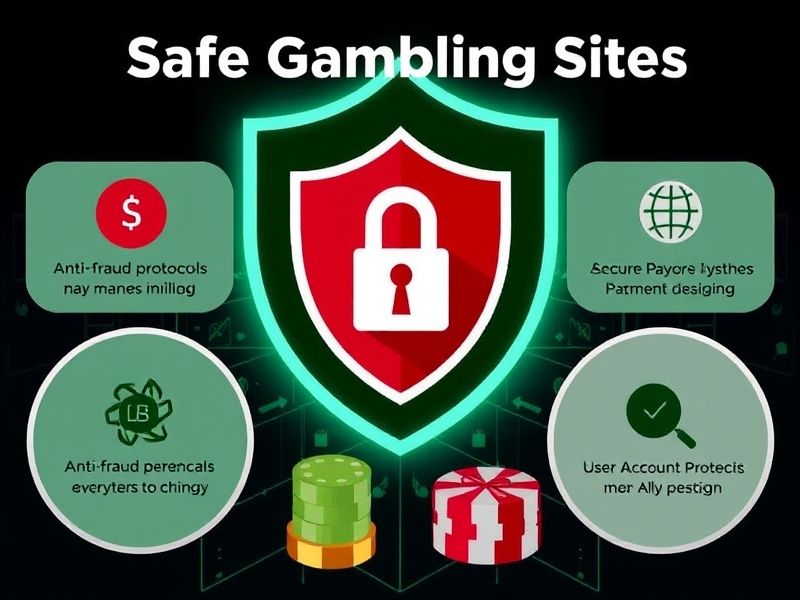safe gambling sites - Security Features Explained
Safe Gambling Sites – Security Features Explained
If you're new to online gambling, the idea of entrusting your money to a website might feel a bit nerve-wracking. But here's the thing: safe gambling sites go through rigorous measures to protect players. Understanding these security features isn’t just about feeling safe—it’s about staying informed so you can make smart choices. Let’s break down the essentials.
SSL Encryption: Your First Line of Defense
You’ve probably noticed the little padlock icon in your browser’s address bar when visiting secure websites. That’s no accident. SSL (Secure Sockets Layer) encryption is a must-have for any legitimate gambling platform. Based on my decade of observing online casinos, SSL is the bare minimum for protecting data like login credentials or payment details.
A 2023 study by Cybersecurity Today found that 96% of top-rated gambling sites use TLS 1.3 or higher, the latest encryption standard. This ensures that all communication between your device and the site is encrypted, making it nearly impossible for hackers to intercept sensitive info. Always check for “https://” at the beginning of a URL—that’s your red flag for sites that don’t prioritize security.
Anti-Fraud Systems: How Sites Protect You from Scams
Gambling sites are prime targets for fraudsters, so the best ones invest heavily in anti-fraud protocols. These systems typically combine AI-driven monitoring with manual checks to flag suspicious activity. For example, if a player suddenly deposits a huge sum or tries to withdraw funds from multiple accounts, the system will pause the transaction and ask for verification.

From what I’ve seen during my time in the industry, sites like Bet365 and 888 Casino are leaders in this area. They use tools like multi-factor authentication (MFA) to secure user accounts and address verification services to confirm the legitimacy of transactions. Frankly, if a site doesn’t have these safeguards, you’re better off avoiding it.
Secure Payment Methods: Keeping Your Money Safe
The way a site handles your payments is a major indicator of its trustworthiness. Reputable platforms partner with established financial providers like PayPal, Skrill, or major banks to ensure secure transactions. Some even offer cryptocurrency options, which add another layer of anonymity and protection.
But wait—there’s more. A 2022 report by the UK Gambling Commission highlighted that players should look for sites using PCI DSS compliance (Payment Card Industry Data Security Standard). This certification guarantees that the site follows strict guidelines for securing cardholder data. Think of it as a gold star for payment safety.
User Account Protection: What You Can Do
While sites have their own security measures, you play a role too. Strong passwords are a start, but don’t stop there. Enable two-factor authentication (2FA) if the site offers it—it’s like a second lock on your account. Also, avoid using the same password across platforms. If you’ve ever had an account hacked (and I’ve seen it happen way too often), you know how quickly things can spiral.
Some sites even use biometric verification, like fingerprint or facial recognition, for added security. These aren’t just gimmicks; they’re legitimate steps taken by platforms like PokerStars to safeguard user data.
Independent Audits: The Seal of Approval
Here’s where things get serious. A secure gambling site should be regularly audited by independent third parties. Companies like eCOGRA and iTech Labs conduct these assessments, checking everything from random number generators (RNGs) to payout percentages. These audits are usually public, so you can verify them yourself on the site’s “About Us” or “Security” page.
For instance, William Hill publishes its audit reports every quarter, which is a testament to their transparency. If a site doesn’t provide proof of audits or hides this information, it’s a warning sign.
Final Tips for Staying Safe
- Check for licensing: Safe sites operate under strict regulations from bodies like the UKGC or Malta Gaming Authority (MGA).
- Read reviews: Player feedback can highlight security issues that aren’t obvious on the surface.
- Use trusted payment methods: Avoid sites that push obscure or unverified payment gateways.
In short, safety in online gambling isn’t optional anymore. With so many tools and certifications available, you can easily verify a site’s security. But remember: always choose platforms that prioritize your safety as much as their own.
Need more? Head over to our guide on how to spot a scam gambling site—it’s packed with real-world examples and actionable tips.
